- Home
- Michael Swanwick
Cold Iron
Cold Iron Read online
Jerry eBooks
No copyright 2016 by Jerry eBooks
No rights reserved. All parts of this book may be reproduced in any form and by any means for any purpose without any prior written consent of anyone.
Asimov’s Science Fiction
November 1993
Vol. 17, Nos. 12 & 13
(Whole Numbers 207 & 208)
Custom eBook created by
Jerry eBooks
August 2016
1.
The changeling’s decision to steal a dragon and escape was born, though she did not know it then, the night the children met to plot the death of their supervisor.
She had lived in the steam dragon plant for as long as she could remember. Each dawn she was marched with the other indentured minors from their dormitory in Building 5 to the cafeteria for a breakfast she barely had time to choke down before work. Usually she was then sent to the cylinder machine shop for polishing labor, but other times she was assigned to Building 12, where the black iron bodies were inspected and oiled before being sent to the erection shop for final assembly. The abdominal tunnels were too small for an adult. It was her duty to crawl within them to swab out and then grease those dark passages. She worked until sunset and sometimes later if there was a particularly important dragon under contract.
Her name was Jane.
The worst assignments were in the foundries, which were hellish in summer even before the molds were poured and waves of heat slammed from the cupolas like a fist, and miserable in winter, when snow blew through the broken windows and a grey slush covered the workfloor. The knockers and hogmen who labored there were swart, hairy creatures who never spoke, blackened and muscular things with evil red eyes and intelligences charred down to their irreducible cinders by decades-long exposure to magickal fires and cold iron. Jane feared them even more than she feared the molten metals they poured and the brute machines they operated.
She’d returned from the orange foundry one twilit evening too sick to eat, wrapped her thin blanket tight about her and fallen immediately asleep. Her dreams were all in a jumble. In them she was polishing, polishing, while walls slammed down and floors shot up like the pistons of a gigantic engine. She fled from them under her dormitory bed, crawling into the secret place behind the wallboards where she had, when younger, hidden from Rooster’s petty cruelties. But at the thought of him, Rooster was there, laughing meanly and waving a three-legged toad in her face. He chased her through underground caverns, among the stars, through boiler rooms and machine shops.
The images stabilized. She was running and skipping through a world of green lawns and enormous spaces, a strangely familiar place she knew must be Home. This was a dream she had often. In it, there were people who cared for her and gave her all the food she wanted. Her clothes were clean and new, and nobody expected her to put in twelve hours daily at the workbench. She owned toys.
But then, as it always did, the dream darkened. She was skipping rope at the center of a vast expanse of grass when some inner sense alerted her to an intrusive presence. Bland white houses surrounded her, and yet the conviction that some malevolent intelligence was studying her increased. There were evil forces hiding beneath the sod, clustered behind every tree, crouching under the rocks. She let the rope fall to her feet, looked about wonderingly, and cried a name she could not remember.
The sky ripped apart.
“Wake up, you slattern!” Rooster hissed urgently. “We coven tonight. We’ve got to decide what to do about Stilt.”
Jane jolted awake, heart racing. In the confusion of first waking, she felt glad to have escaped her dream, and sorry to have lost it. Rooster’s eyes were two cold gleams of moonlight afloat in the night. He knelt on her bed, bony knees pressing against her. His breath smelled of elm bark and leaf mold intermingled. “Would you mind moving? You’re poking into my ribs.”
Rooster grinned and pinched her arm.
She shoved him away. Still, she was glad to see him. They’d established a prickly sort of friendship, and Jane had come to understand that beneath the swagger and thoughtlessness, Rooster was actually quite nice. “What do we have to decide about Stilt?”
“That’s what we’re going to talk about, stupid!”
“I’m tired,” Jane grumbled. “I put in a long day, and I’m in no mood for your hijinks. If you won’t tell me, I’m going back to sleep.”
His face whitened and he balled his fist. “What is this—mutiny? I’m the leader here. You’ll do what I say, when I say, because I say it. Got that?”
Jane and Rooster matched stares for an instant. He was a mongrel fey, the sort of creature who a century ago would have lived wild in the woods, emerging occasionally to tip over a milkmaid’s stool or loosen the stitching on bags of milled flour so they’d burst when flung over a shoulder. His kind were shallow, perhaps, but quick to malice and tough as rats. He worked as a scrap iron boy, and nobody doubted he would survive his indenture.
At last Jane ducked her head. It wasn’t worth it to defy him.
When she looked up, he was gone to rouse the others. Clutching the blanket about her like a cloak, Jane followed. There was a quiet scuffling of feet and paws, and quick exhalations of breath as the children gathered in the center of the room.
Dimity produced a stolen candle stub and wedged it in the widest part of a crack between two warped floorboards. They all knelt about it in a circle. Rooster muttered a word beneath his breath and a spark leaped from his fingertip to the wick.
A flame danced atop the candle. It drew all eyes inward and cast leaping phantasms on the walls, like some two-dimensional Walpurgisnacht. Twenty-three lesser flames danced in their irises. That was all dozen of them, assuming that the shadow-boy lurked somewhere nearby, sliding away from most of the light and absorbing the rest so thoroughly that not a single photon escaped to betray his location.
In a solemn, self-important voice, Rooster said: “Blugg must die.” He drew a gooly-doll from his jerkin. It was a misshapen little thing, clumsily sewn, with two large buttons for eyes and a straight gash of charcoal for a mouth. But there was the stench of power to it, and at its sight several of the younger children closed their eyes in sympathetic hatred. “Skizzlecraw has the crone’s-blood. She made this.” Beside him, Skizzlecraw nodded unhappily. The gooly-doll had been her closely guarded treasure, and the Lady only knew how Rooster had talked her out of it. He brandished it over the candle. “We’ve said the prayers and spilt the blood. All we need do now is sew some touch of Blugg inside the stomach and throw it onto a furnace.”
“That’s murder!” Jane said, shocked.
Thistle snickered.
“I mean it! And not only is it wrong, but it’s a stupid idea as well.” Thistle was a shifter, as was Stilt himself, and like all shifters she was something of a lack-wit. Jane had learned long ago that the only way to silence Thistle was to challenge her directly. “What good would it do? Even if it worked—which I doubt—there’d be an investigation afterwards. And if by some miracle we weren’t discovered, they’d still only replace Blugg with somebody every bit as bad. So what’s the point of killing him?”
That should have silenced them. But to Jane’s surprise, a chorus of angry whispers rose up like cricket song.
“He works us too hard!”
“He beats me!”
“I hate that rotten Old Stinky!”
“Kill him,” the shadow-boy said in a trembling voice from directly behind her left shoulder. “Kill the big dumb fuck!” She whirled about and he wasn’t there.
“Be still!” Casting a scornful look at Jane, Rooster said, “We have to kill Blugg. There is no alternative. Come forward, Stilt.”
Stilt scootched a little closer. His legs were so long that when h
e sat down his knees were higher than his head. He slipped a foot out of his buskin and unself-consciously scratched himself behind an ear.
“Bend your neck.”
The scrawny young shifter obeyed. Rooster shoved the head further down with one hand, and with the other pushed aside the lank, ditchwater hair. “Look—pinfeathers!” He yanked up Stilt’s head again, and waggled the sharp, foot-long nose to show how it had calcified. “And his toes are turning to talons—see for yourselves.”
The children pushed and shoved at one another in their anxiety to see. Stilt blinked, but suffered their pokes and prods with dim stoicism. Finally, Dimity sniffed and said, “So what?”
“He’s coming of age, that’s so what. Look at his nose! His eyes! Before the next Maiden’s Moon, the change will be upon him. And then, and then . . .” Rooster paused dramatically.
“Then?” the shadow-boy prompted in a papery, night-breeze of a voice. He was somewhere behind Thistle now.
“Then he’ll be able to fly!” Rooster said triumphantly. “He’ll be able to fly over the walls to freedom, and never come back.”
Freedom! Jane thought. She rocked back on her heels, and imagined Stilt flapping off clumsily into a bronze-green autumn sky. Her thoughts soared with him, over the walls and razor-wire and into the air, the factory buildings and marshalling yards dwindling below, as he flew higher than the billowing exhaust from the smokestacks, into the deepening sky, higher than Dame Moon herself. And never, oh never, to return!
It was impossible, of course. Only the dragons and their half-human engineers ever left the plant by air. All others, workers and management alike, were held in by the walls and, at the gates, by security guards and the hulking cast iron Time Clock. And yet at that instant she felt something take hold within her, a kind of impossible hunger. She knew now that the idea, if nothing more, of freedom was possible, and, that established, the desire to be free herself was impossible to deny.
Down at the base of her hindbrain, something stirred and looked about with dark interest. She experienced a moment’s dizzy nausea, a removal into some lightless claustrophobic realm, and then she was once again deep in the maw of the steam dragon plant, in the little dormitory room on the second floor of Building 5, wedged between a pattern store room and the sand shed, with dusty wooden beams and a tarpaper roof between her and the sky.
“So he’ll get to fly away,” Dimity said sourly. Her tail lashed back and forth discontentedly. “So what? Are we supposed to kill Blugg as a going-away present?”
Rooster punched her on the shoulder for insubordination. “Dolt! Pimple! Douchebag! You think Blugg hasn’t noticed? You think he isn’t planning to make an offering to the Goddess, so she’ll keep the change away?”
Nobody else said anything, so reluctantly Jane asked, “What kind of offering?”
He grabbed his crotch with one hand, formed a sickle with the other, and then made a slicing gesture with the sickle. His hand fell away. He raised an eyebrow. “Get it?”
She didn’t really, but Jane knew better than to admit that. Blushing, she said, “Oh.”
“Okay, now, I’ve been studying Blugg. On black foundry days, he goes to his office at noon, where he can watch us through the window in his door, and cuts his big, ugly nails. He uses this humongous great knife, and cuts them down into an ashtray. When he’s done, he balls them up in a paper napkin and tosses it into the foundry fires, so they can’t be used against him.
“Next time, though, I’m going to create a disturbance. Then Jane will slip into his office and steal one or two parings. No more,” he said, looking sternly at her, “or he’ll notice.”
“Me?” Jane squeaked. “Why me?”
“Don’t be thick. He’s got his door protected from the likes of the rest of us. But you—you’re of the other blood. His wards and hexes won’t stop you”
“Well, thanks heaps,” Jane said. “But I won’t do it. It’s wrong, and I’ve already told you why.” Some of the smaller children moved toward her threateningly. She folded her arms. “I don’t care what you guys say or do, you can’t make me. Find somebody else to do your dirty work!”
“Aw, c’mon. Think of how grateful we’d all be.” Rooster got up on one knee, laid a hand across his heart and reached out yearningly. He waggled his eyebrows comically. “I’ll be your swain forever.”
“No!”
Stilt was having trouble following what they were saying. In his kind this was an early sign of impending maturity. Brow furrowed, he turned to Rooster and haltingly said, “I . . . can’t fly?”
Rooster turned his head to the side and spat on the floor in disgust. “Not unless Jane changes her mind.”
Stilt began to cry.
His sobs began almost silently, but quickly grew louder. He threw back his head, and howled in misery. Horrified, the children tumbled over one another to reach him and stifle his cries with their hands and bodies. His tears muffled, then ceased.
For a long, breathless moment they waited to hear if Blugg had been roused. They listened for his heavy tread coming up the stairs, the angry creaking of old wood, felt for the stale aura of violence and barely suppressed anger that he pushed before him. Even Rooster look frightened.
But there came no sound other than the snort of cyborg hounds on patrol, the clang and rustle of dragons in the yards stirring restlessly in their chains, and the distant subaudible chime of midnight bells celebrating some faraway sylvan revelry. Blugg still slept.
They relaxed.
What a shivering, starveling batch they were! Jane felt a pity for them all that did not exclude herself. A kind of strength hardly distinguishable from desperation entered her then and filled her with resolve, as though she were nothing more than an empty mold whose limbs and torso had been suddenly poured through with molten iron. She burned with purpose. In that instant she realized that if she were ever to be free, she must be tough and ruthless. Her childish weaknesses would have to be left behind. Inwardly she swore, on her very soul, that she would do whatever it took, anything, however frightening, however vile, however wrong.
“All right,” she said. “I’ll do it.”
“Good.” Without so much as a nod of thanks, Rooster began elaborating his plot, assigning every child a part to play. When he was done, he muttered a word and made a short, chopping pass with his hand over the candle. The flame guttered out.
Any one of them could’ve extinguished it with the slightest puff of breath. But that wouldn’t have been as satisfying.
The black foundry was the second largest workspace in all the plant. Here the iron was poured to make the invulnerable bodies and lesser magick-proofed parts of the great dragons. Concrete pits held the green sand, silt mixes and loam molds. Cranes moved slowly on overhead beams, and the October sunlight slanted down through airborn dust laboriously churned by gigantic ventilating fans.
At noon an old lake hag came by with the lunch cart, and Jane received a plastic-wrapped sandwich and a cup of lukewarm grapefruit juice for her portion. She left her chamois gloves at the workbench, and carried her food to a warm, dusty niche beside a wood frame bin filled with iron scrap, a jumble of claws, scales and cogwheels.
Jane set the paper cup by her side, and smoothed her coarse brown skirt comfortably over her knees. Closing her eyes, she pretended she was in a high-elven cloud palace. The lords and ladies sat about a long table, all marble and white lace, presided over by slim tapers in silver sticks. The ladies had names like Fata Elspeth and Fata Morgaine, and spoke in mellifluous polysyllables. Their laughter was like little bells and they called her Fata Jayne. An elven prince urged a bowl of sorbet dainties on her. There was romance in his eyes. Dwarven slaves heaped the floor with cut flowers in place of rushes.
She took a bite of sandwich, and chewed it slowly to make it last.
Crouched in the arch of the window was her very own aquilohippus, jeweled saddle on its back, and anxious to fly. Its glance was fierce and its beak as sharp as razors.
Nobody but she dared ride it, but to her it was very gentle and sweet. Its name was—
Somebody stomped on her foot.
“Oh!” Jane scrambled to her feet, knocking over her juice, and saw that Rooster had just passed her, a bag of scrap slung over his shoulder—he was on the second lunch shift, and still working. “Heads up, dipshit! It’s almost time!” he growled from the comer of his mouth. Then, to take the sting off his words, he smiled and winked. But it was a wan and unconvincing smile. If she hadn’t known better, she’d’ve thought him afraid.
Then he was gone.
Her peaceful mood was shattered. Briefly, she had forgotten Rooster’s wild plan. Now it came back to her, and with it the certainty that it would never work. She would be caught and punished, and there was nothing she could do about it. She had given her word.
The wall of the foundry furthest from the cupolas held a run of narrow offices for shop-level supervisors. Jane shoved her sandwich into the pocket of her work apron, and peered around the edge of the bin. She could see Blugg’s office and within it Blugg seated at his desk, cigar in mouth, slowly leafing through a glossy magazine.
Blugg was fat and burly, with heavy jowls and a low brow. He had wispy flyaway hair, which was thinning and which he never tended, and a curling pair of ram’s horns of which he was inordinately vain. For special occasions he had them lacquered and varnished, and once a year on Samhain, he would gild the tips. Traces of gold remained in the whorls and ridges for weeks after.
“Hsst!”
Jane turned. The shadow-boy was standing in the niche she had just vacated, a ragged figure dim and difficult to see even at high noon. “Rooster sent me,” he said. “I’m supposed to keep lookout for you.” She could not make out the expression on his face, but his voice trembled.
She felt awful now, and afraid. “I can’t,” she said. She didn’t have the nerve to go ahead with it. “I just—”
A roar shattered the midday calm. Suddenly everyone was running, throwing down tools, scuttling out onto the workfloor and climbing up on the molds to see what was going on. They were all rushing toward the cupolas. Something was happening there. Jane stared into the swirl of figures, unable to make sense of all the noise and motion. Then suddenly everything snapped into place.

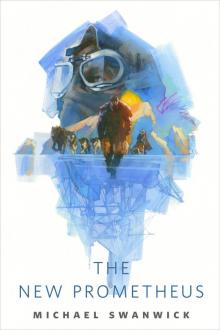 The New Prometheus
The New Prometheus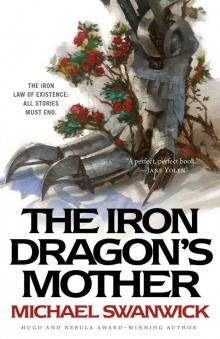 The Iron Dragon’s Mother
The Iron Dragon’s Mother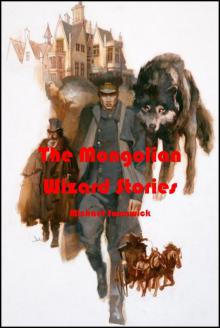 The Mongolian Wizard Stories
The Mongolian Wizard Stories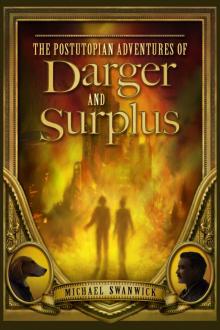 The Postutopian Adventures of Darger and Surplus
The Postutopian Adventures of Darger and Surplus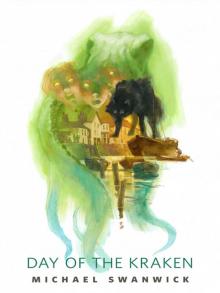 Day of the Kraken
Day of the Kraken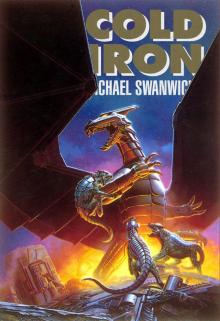 Cold Iron
Cold Iron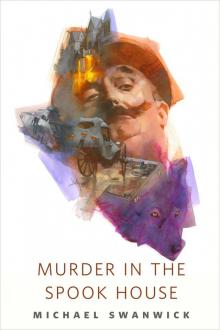 Murder in the Spook House: A Tor.com Original
Murder in the Spook House: A Tor.com Original Radio Waves
Radio Waves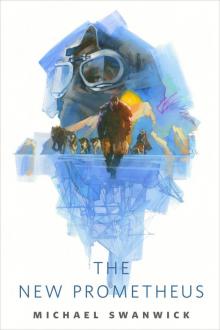 The New Prometheus: A Tor.com Original
The New Prometheus: A Tor.com Original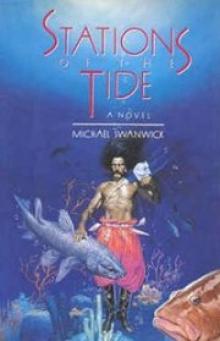 Stations of the Tide
Stations of the Tide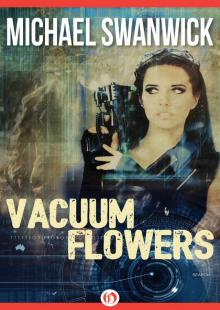 Vacuum Flowers
Vacuum Flowers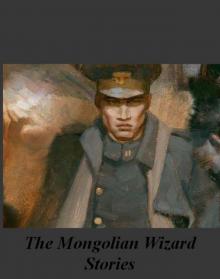 The Mongolian Wizard Stories (online stories 1-7)
The Mongolian Wizard Stories (online stories 1-7)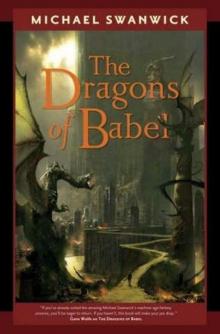 The Dragons of Babel
The Dragons of Babel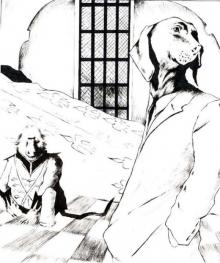 The Dog Said Bow-Wow
The Dog Said Bow-Wow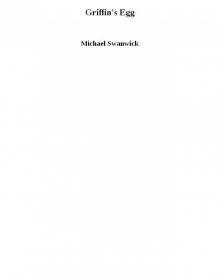 Griffin's Egg
Griffin's Egg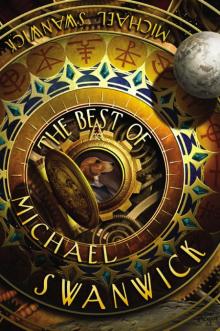 The Best of Michael Swanwick
The Best of Michael Swanwick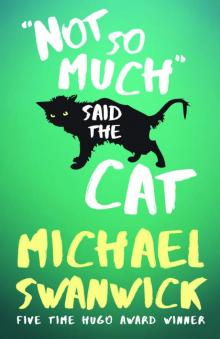 Not So Much, Said the Cat
Not So Much, Said the Cat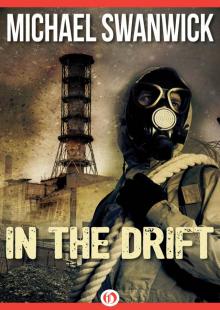 In the Drift
In the Drift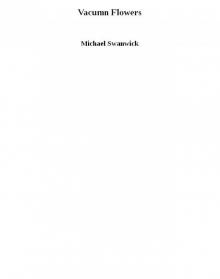 Vacumn Flowers
Vacumn Flowers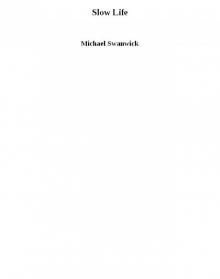 Slow Life
Slow Life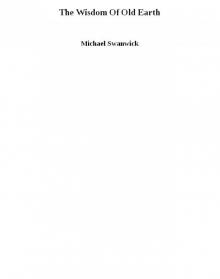 The Wisdom Of Old Earth
The Wisdom Of Old Earth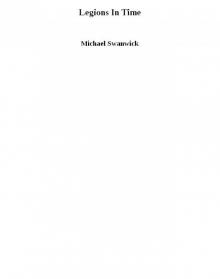 Legions In Time
Legions In Time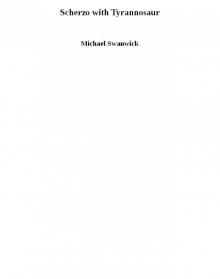 Scherzo with Tyrannosaur
Scherzo with Tyrannosaur The Year's Best Science Fiction (2008 Edition)
The Year's Best Science Fiction (2008 Edition)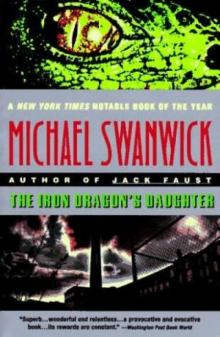 The Iron Dragon's Daughter
The Iron Dragon's Daughter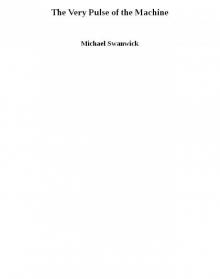 The Very Pulse of the Machine
The Very Pulse of the Machine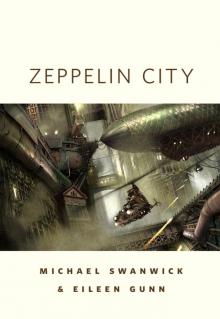 Zeppelin City
Zeppelin City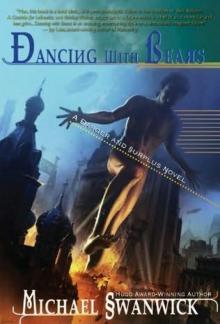 Dancing with Bears
Dancing with Bears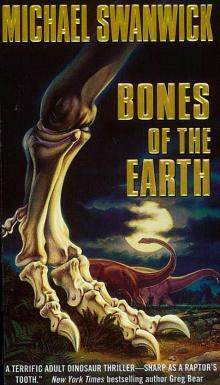 Bones of the Earth
Bones of the Earth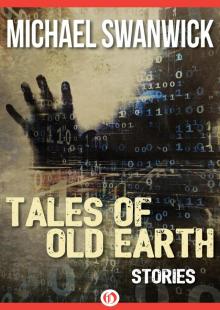 Tales of Old Earth
Tales of Old Earth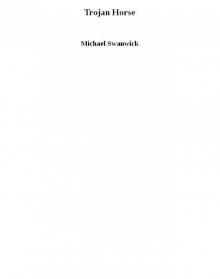 Trojan Horse
Trojan Horse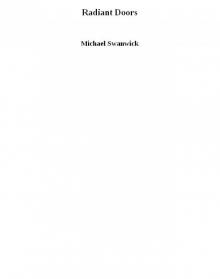 Radiant Doors
Radiant Doors